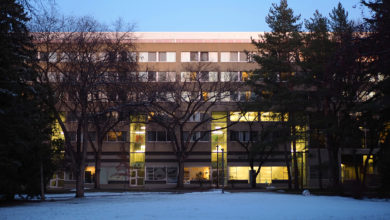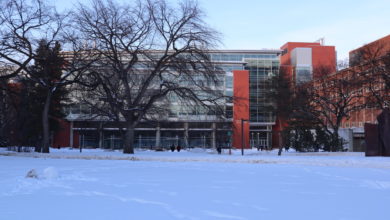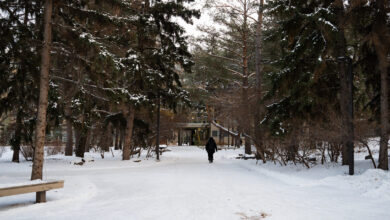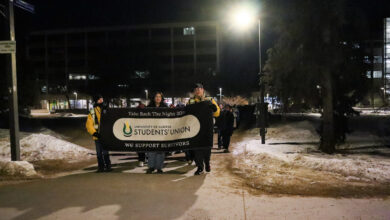U of A professor releases podcast investigating the cultural sleep obsession
“The way that we talk about sleep is not just about sleep. It’s a symptom of other things in the culture,” professor and philosopher Cressida Heyes says.
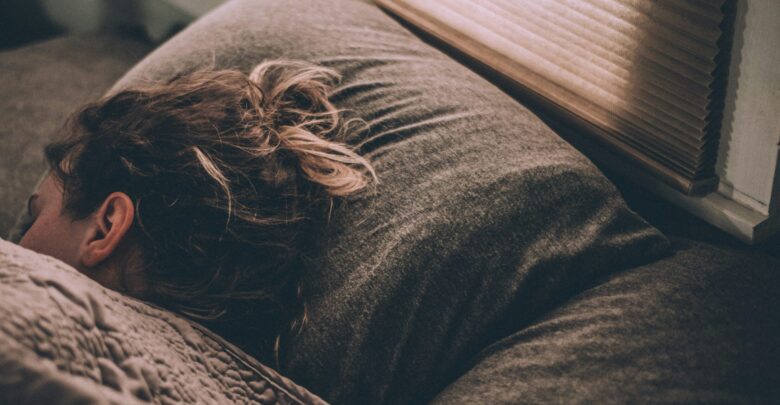 Greg Pappas
Greg PappasFor 16 years, Cressida Heyes hasn’t stopped thinking about sleep, and according to Heyes, neither can the rest of us. Now, the University of Alberta political science professor and philosopher has released a podcast exploring the reasons behind the cultural obsession with sleep.
Released on October 6, Sleep is the New Sex is hosted by Heyes and PhD political science student Joshua Ayer and is produced by Tom Merklinger, the program and technical co-ordinator at the Sound Studies Institute. Each episode features a guest and focuses on their research into sleep.
“The way that we talk about sleep is not just about sleep. It’s a symptom of other things in the culture,” Heyes says
After having a baby 16 years ago, Heyes began thinking about sleep — because suddenly she wasn’t getting any of it. Heyes “became completely exhausted with sleep deprivation very quickly,” a common experience for new parents, they added.
“I was really struck by the experience of sleep deprivation and how it kind of made it impossible to do anything else.”
At the time, Heyes had noticed discussions around sleep were seeing a rise in popularity. However, these conversations were repetitious, usually doling out the same advice. Heyes found this frustrating. With a new baby, it was advice they simply couldn’t follow.
“I gradually started to realize that sleep was, as we might say, symptomatic. The way that we talk about sleep is not just about sleep. It’s a symptom of other things in the culture.”
The podcast’s title, Sleep is the New Sex, comes from the idea that “sleep has taken over from sex in the popular imagination as a topic for cultural anxiety and thwarted need.”
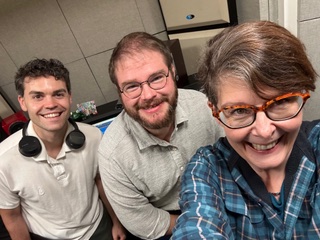
To keep up with news stories about sleep, Heyes had a Google alert set up. Eventually, she had to turn it off “because there were just so many alerts coming in.”
“So any news media that you consume, whether it’s just ordinary pop media, like Buzzfeed, or whether it’s highbrow, like The Guardian, there will be a tag for sleep related stories,” they said. “They are everywhere. There are literally millions of media stories that involve sleep.”
Precarious working conditions and employer prerogative has left workers with less control over their time, Heyes says
While discussions around sex have not completely disappeared, the amount of talk and literature on sleep has taken off in the last 15 to 20 years, Heyes explained.
“When I started work on this, there was very little in the humanities and social sciences about sleep, and now I can’t keep up with the literature.”
A few societal changes have influenced this, Heyes explained. For one, working conditions have become more precarious and employees are more subject to employer prerogative, leaving workers with less control over their time. Released on November 17, episode five of the podcast “Fast Sleep?” covers this topic.
Women have always held responsibility for the majority of child rearing, especially with infants.
Now, more women hold full-time employment, but that domestic labour imbalance hasn’t necessarily shifted, Heyes said.
In a study on sleep coaches, Heyes found that “overwhelmingly” women were told by their husbands that they were fully responsible for taking care of their baby during the nighttime.
“The way that we structure work has become less within our control, whether it’s unpaid work within families, domestic work, or whether it’s paid work outside the home.”
Sleep is the New Sex is ultimately about understanding the various reasons motivating the cultural obsession with sleep.
Heyes hopes the podcast will spark conversations about sleep that go beyond “this kind of advice giving mode”
Some of Heyes’ research about sleep was featured in their book the Anaesthetics of Experience. Next, Heyes hopes to write a more popular book based on her research and the podcast material.
Additionally, Heyes wants to write more about sleep and disability. Heyes also wants to explore the interface between the humanistic and scientific studies of sleep. Right now, there is not much conversation between the people who work on either side of sleep research, Heyes said.
Heyes hopes the podcast will reach a larger audience outside of academia and start conversations about sleep that go beyond “this kind of advice giving mode.”
“[I hope] that it encourages people to talk about time, work, gender, stereotypes, and stories, and all the things that we talk about as [we] talk about sleep.”

